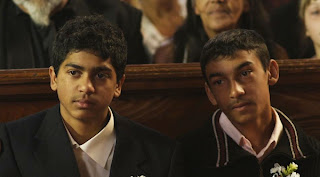FROM CHANGE.ORG
BY GREGORY MILLER
PHOTO: www.cchrint.org
This is hard for me to say, but on Wednesday, the leadership of the Massachusetts House of Representatives chose not to support a bill that would ban the use of electric shocks on disabled people in the state. Massachusetts is the only state in the country where this still takes place.
Even though
this bill didn't pass, I'm incredibly proud of the attention we've brought to
the abuse taking place at the JRC. Here are some of the things that we've
accomplished:
- The United Nations has announced that they are now investigating the JRC's use of electric shocks to see if they meet the international guidelines for torture.
- Anderson Cooper exposed that the JRC has been misleading the public about having FDA approval for its electric shock machines, and the campaign has been covered by media from CNN to Fox News.
- More than 30 human rights and disability organizations came out in support of our efforts.
It was always going to be a hard fight -- the
JRC spent millions of dollars on lawyers, lobbyists and public relations
professionals to influence these lawmakers. But thanks to your support, the
world knows what goes on in Canton, Massachusetts, and the JRC won’t be able to
escape scrutiny like before.
For the moment,
we haven't won this campaign -- but the
petition will still be updated with information about the effort to
protect the disabled in Massachusetts. And I hope you will keep talking about
this issue with your friends, families and legislators.
Again, thank
you for supporting my campaign,
Gregory
Miller
Former JRC
Employee
P.S. New York
is now considering a bill that would ban state tax dollars from being used at
the JRC if they continue shocking students, and disability advocates are asking for help to make sure it
passes.
------------------------------------------------------------------------------------------------------------------------------------------------------
BACKGROUND:
FROM CHANGE.ORG
At a “special needs school” in Canton, Massachusetts, children and teenagers with autism and other disabilities are being administered electric shocks as a means of controlling their behaviors. As a former Teacher’s Assistant, I regret having participated firsthand at this school - The Judge Rotenberg Center (JRC).The human rights abuses taking place at the JRC are well documented. The United Nations is aware of the JRC and has called these shocks “torture”, and says that “The prohibition of torture is absolute.” Yet the school continues to use a powerfully painful electric shock device on students to control their behaviors. These devices are reportedly much stronger than police stun guns and were created by the founder of the Judge Rotenberg Center.
The Judge Rotenberg Center must immediately stop its practice of shocking special needs students.
Rather than shocking students for only severe behaviors, student behavior plans at JRC dictated that we shock certain students for even the most minor of behavioral issues like closing their eyes for 15 seconds while sitting at the desk, pulling apart a loose piece of thread, tearing an empty used paper cup, or for standing up and raising a hand to ask to go to the bathroom. In some classrooms, very often students who observe their peers being shocked react in fear by standing up out of their seat, yelling or crying, or throwing down their task -- and are then shocked for these reactions.
A non-verbal nearly blind girl with cerebral palsy was shocked as part of her behavioral plan for making a moaning sound and for attempts to hold a staff’s hand (her attempts to communicate and to be loved).
In 2002, 18 year-old Andre McCollins was strapped down and shocked for hours at the JRC. He begged for the shocks to stop and when they did, he was left in a catatonic state for days which resulted in permanent damage. Video of Andre’s shock treatment was sealed until recently and you can view it here.
The JRC’s founder, Dr. Matthew Israel, resigned after being charged with misleading a grand jury by destroying video footage of other students being shocked.
Not only does the JRC need to immediately stop this practice but Massachusetts legislators need to make these shock procedures illegal. These students are among Massachusetts’ most vulnerable citizens and have no voice of their own to describe their pain. They need your help.
Demand that the JRC stop shocking students now!

















FROM THE HUFF POST WORLD
http://www.huffingtonpost.com/2012/06/14/myanmar-conflict-rohingya-muslims_n_1595976.html